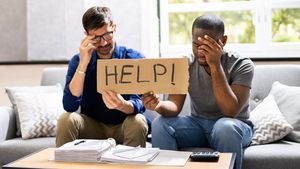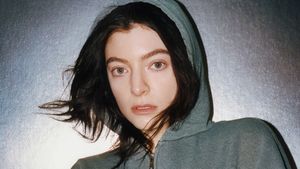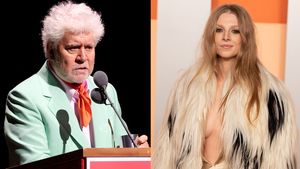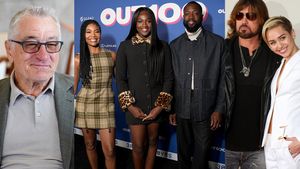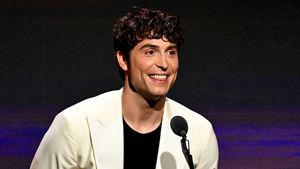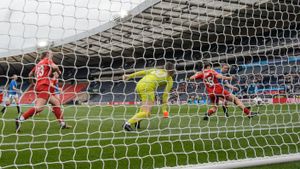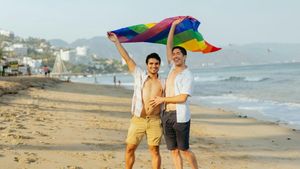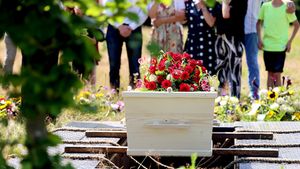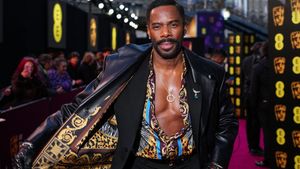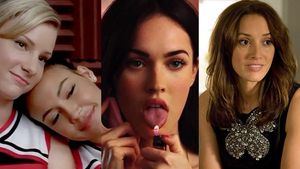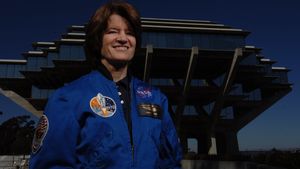Could there be a more perfect setting for the seventh season of Queer Eyethan New Orleans? It’s a notoriously warm and inviting place that brims with bright colors and vibrates with culture. Alternatively, it’s also a city that has struggled to survive unfathomable tragedy; it’s marked by trauma and pain, and in need of an infusion of hope. It’s not only a location but a metaphor for who the Fab Five are and is emblematic of their mission. For seven seasons (plus one in Japan) Antoni Porowski, Bobby Berk, Jonathan Van Ness, Karamo Brown, and Tan France have hit the road to inspire, heal, and bring hope to one “hero” at a time. They encounter no shortage of opportunities in NOLA.
In its seventh season, Queer Eyemanages to remain just as hilarious, inspiring, and cathartic as it ever was. If anything, it’s even more so, in a time when we are once again craving kindness and empathy to a degree we haven’t since the post-2016 election era — which, coincidentally, was when the show first arrived on Netflix.

Niño Munoz/Netflix
France will inevitably whip a “French tuck” friendly wardrobe into shape; Porowski will first smell his way through a kitchen nightmare and then craft a dream of a meal; Van Ness will joyfully espouse a poignant makeover; Berk will miraculously perform a full house transplant seemingly overnight; and Brown will reach into his hero’s heart to pluck out, examine, and begin to heal traumas they didn’t even know existed.
Seven seasons is a massive accomplishment for any TV show, and no one is more surprised by the success and longevity of the series than (most) of the Fab Five themselves. When asked if he believed it would run for seven seasons (or more), Berk laughs. “Absolutely not!”
“I literally can put myself right back in the car as we were leaving Mama Tammye’s, which was the last episode we filmed in [Georgia]. It was me and my other Fabbers and we were in the car. And literally, we were starving. And so we went to the McDonald’s drive-thru because it was the only thing available out in the middle of nowhere,” he recalls. “We were kind of saying our goodbyes. And we were like, ‘Oh, this has been fun. But you know, this is probably the last time we’ll work together.’ No one’s probably gonna watch the show. Like, it’s been a blast to make it but good luck with everything!”
This incredulous tone was echoed by all of Berk’s costars, sans one: Brown. “I think all the rest of them are gonna say no, they did not think it,” he predicts. “I’m the opposite. I knew and believed.” But this, he explains, was not born of ego but rather something he felt in the intentions of his soon-to-be costars the first day they all met.
“The five of us actually got together on day one of the casting... we organically matched up,” Brown recalls. “Because we literally were the only ones in there who weren’t thinking about the show. We were all curious about who we were helping, and how fun it would be to help these people and like, oh my God, what cool things we could do. From day one.”

Ilana Panich-Linsman/Netflix
He remembers that through the initial shoot that spirit remained and it gave him confidence in what they were making. “Tan was a little nervous. Antoni was a little nervous. But even through those nerves, we kept saying, ‘You know what, we just want them to have the best experience. What can we do to make them have the best experience?’ Anytime in life when your intention and your motive is for someone else’s happiness, success always follows that,” says Brown. “None of us talked about the paycheck. None of us talked about fame. We’re talking about how much we want to help.”
After the show wrapped, the waiting game began, and Porowski recalls a moment before the show aired when he first wondered if it would change their lives. “I was actually chatting [about this] last time I went to visit Tan in Salt Lake,” says Porowski. “I remember, he came on a family trip with me...it was right after we finished filming [season one] in Atlanta. Tan was wearing this ridiculous big straw conical hat so that he wouldn’t get sunburned. And we’re sitting in the water and just like looking out into the Caribbean. And we’re asking ourselves, like, ‘Are our lives going to change? Is anything going to be different at all? Or is this going to be a flash in the pan, one season will come out and then no one’s really going to catch on?’ We didn’t know, we [only] knew how much we enjoyed doing the show.”

Niño Munoz/Netflix
Cut to the day that the new Fab Five were announced. “I was in the middle of an Italian lesson because I was keeping myself busy at a friend’s restaurant with my teacher. And that’s when news broke of who the new Fab Five were,” Porowski recalls. “And I remember... my phone just started glowing with all of these followers and I was like, I think something’s happening. And then it was just like an endless uphill from there, just like excitement and anxiety and like all the emotions in between.”
For Berk, the moment he realized that the show really had legs was even more dramatic. “We were in Swansea, Wales, BBC [Radio 1]’s biggest weekend — it’s like their Coachella,” he says. They were in the artists’ tents listening as massive act after massive act, including Ed Sheeran and Taylor Swift, took to the stage, and they listened as the crowds cheered in excitement. The Fab Five had been given the honor of going out on stage to say hello and introduce Olly Alexander and Years & Years, who would be performing. “When we walked up on stage, the crowd just flipped out, like more so than the other artist’s applause that I could hear. We were in a foreign country and — I can’t remember if season two had come out already — or maybe season two was about to come out. But to walk out on that stage and see a crowd of about 80,000 people just roar with excitement that we were there. It just blew my mind. I held it together on stage. But then as we got off stage, I went down to the right front stage to like, watch Olly and Years & Years perform. I just started bawling. I could not stop. People were looking at me, like, ‘Are you okay?’ And I’m like, ‘I’m great’ And I tried to play it off. I’m like, ‘Olly’s just so talented, he’s just making me cry!’” Berk recalls with a laugh. “Yeah,
that was the moment that I was like, holy shit. This. This is a global movement.”

Niño Munoz/Netflix
And that mission of kindness — and fabulous makeovers — has also meant that the Fab Five have spent the last six years going to places around the country, often on the forefront of the cultural pushback, whether that be to the queer community, the growing tsunami of legislation attacking gay and trans people, as well as drag performers. The experience has afforded them a unique and upfront view of the shifting political landscape. Their assessment of whether or not things indeed “just keep getting better” as their theme song purports is, sadly, pretty dire.
“I feel like, in the last six months, the world, especially for queer people, and LGBTQ+ people has gotten worse when I felt it had been getting better,” says a resigned-sounding Berk. “There are certain people out there that are using us and who we are and our mere existence to rally up votes and distract from the fact that they actually aren’t doing anything for their constituents other than coming for trans people and drag queens. You know, ‘Hey, we don’t have a plan. So let’s come after some marginalized communities and take the heat off of ourselves.’ I digress.”

Niño Munoz/Netflix
“There is a sense of urgency within our community because there is just like a literal barrage of legislation against the queer community,” adds Van Ness. “I do feel, you know, more of a sense of targeting and I don’t exactly know what the strategy should be for us. Historically if you look, it seems like for a lot of marginalized communities, the story has gone that you take a few steps forward, and then there’s a little regression and then you take a few steps. So overall it’s a positive trajectory, but not without a lot of consistent and frequent setbacks. And it seems like we’re in the midst of a pretty big setback at the moment.”
It wasn’t just the hosts who were feeling the change of tone in the country, shares France. “You can feel the weight of the pressure of what’s going on, in the U.S. in particular, on the queer community that we were helping every queer person that we worked with, you could tell that they were feeling it when we felt it,” he says. “However, I also want to make this clear, and this is going to sound combative, and it’s not meant to be, but things have been contentious for the last few years, including the white queer community. However, for people of color within the queer community, we’ve been there, we’ve seen this for a long time, but we’ve had these pressures within our own micro-communities. And now it just seems to be more mainstream that people are talking about their disapproval of us. So, yes, it seems to have gotten worse over the last few years. But I will say that if you would speak to any person of color or anyone that doesn’t quite fit the white cis mold in the queer community, we’ve been there.”

Niño Munoz/Netflix
The changing political terrain has affected the show over the years, too. “There were some pressures in the very beginning to kind of make Queer Eye like the original Queer Eye for the Straight Guy. And I’m not saying that in a negative way. I’m not saying the people that wanted that were wrong. They had a beautiful, amazing, successful winning formula. Why would you mess with that?” recalls Berk. “But coming out of the situations in life that we were dealing with at the time we were like, ‘I think we kind of want to go in a different direction than that.’”
“When we first started, it felt like we were sharing a queer experience with a relatively conservative group who didn’t understand us,” France notes. “That was just like the opener, that was the teaser. And season after season the more we go into it, the more we’re really peeling back layers of what the queer community means or what marginalized groups are and what they look like. So as much as I love season one and season two, it felt very surface.”

Ilana Panich-Linsman/Netflix
While Van Ness stops short of calling the show a type of activism, he does acknowledge it as a form of social good, particularly in its ability to uplift and highlight the voices of marginalized people and communities. “Maybe it’s like activism adjacent or something,” he says. “We are in an age of so much tapping out and tuning out and not reaching out. And I do think that with Queer Eye, because of the stories that we tell, there is so much access to information.” He points out how, this season, the show explores the plight of educators, the formerly incarcerated, disability rights, and New Orleans itself. “There’s really strong stories that you get a lot of information from when you watch Queer Eye,” he adds.

Niño Munoz/Netflix
Going back to film this season hit a little differently for the cast post-pandemic in the midst of a political shift — and of course in New Orleans, post-Katrina. “The devastation that New Orleans has experienced has created sort of a different feeling around, like, what do we deserve? And how do we make things better for ourselves and, like, we’re so beaten down,” says Brown. “I saw that firsthand from speaking to everyone. There was still a hope. But there was a different hope than maybe our heroes in Atlanta or Kansas City, who, you know, yes, they might have had hardships, but they still believe.”
It felt especially important this time around to Brown that he put in the work to make each week count for every hero. “This season, I was getting deeper because I really wanted there to be longer-lasting effects and longer- lasting changes. My scenes ran some of the longest I’ve ever run because I was spending two or three hours having a conversation with people. Because I just feel like I am not going to leave until we get to the deeper level of what that is.”

Ilana Panich-Linsman/Netflix
One thing is certain, however, and that’s the impact the show has had on the Fab Five personally. As each episode wraps, it’s evident the positive effect it has had on the heroes’ lives — but oftentimes you can sense that a change has occurred in the hosts as well.
“I grew up in an immigrant house, where judgment ran rampant,” Brown laughs “I don’t judge anymore... I immediately always say to myself, there’s a backstory here. And before you say something, or react, ask what is that backstory?”

Ilana Panich-Linsman/Netflix
Practicing radical empathy week after week has helped Berk find more in his life as well. “Especially after 2016, you became very like, ‘oh, here I’m deleting everybody that has a different opinion than me. I cannot deal with this anymore. I’m blocking him. I’m not talking to some family,’” he recalls. While he admittedly hasn’t let everyone back in for his own mental health, his approach is less rigid these days. “Because of the show, it’s kind of forced me to deal with it. And so I think it definitely made me more open and accepting...[of] other people’s points of view. I think a lot of people come to me, they’re like, ‘oh, I just love the healing that you’ve had with religion because of Queer Eye.’ But I can’t say that I have. I don’t think one ever makes peace with what I went through as a child in the church like that. Do I have more empathy and love for individuals in that? Yes, but have I made peace with religion? No. No, no, no.”

Ilana Panich-Linsman/Netflix
While Brown and Berk have learned to see others in a new light, Van Ness has turned that lens inward. “I never
thought of myself as a leader. I never thought of myself as someone who was capable of — Oh my God I’m gonna cry — helping people change. I always was just trying to, like, not die of meth addiction or sexual compulsivity or all the things that I went through in my 20s,” he shares. “So coming through all of that and then seven seasons, everything that’s changed in the last six years in my life is such a stark contrast to what my life was like before.”
The years have also forged a special bond between the Fab Five that is unlike any other they’ve experienced. “It’s like a weird boy band syndrome where we get to vent to each other about stuff that you can’t to almost anybody else ,”says Porowski. “It’s like our own little safe space. And we’ve been through it all together.”

Ilana Panich-Linsman/Netflix
“Do we drive each other crazy sometimes sharing a trailer after seven seasons? Yeah, we do,” Porowski admits. “But as soon as filming is done, we’ll go radio silent for like a month. And then one of us sends like a silly meme on our little group chat that we still have. And it’s kind of like, ‘Okay, when are we doing it again?’”





















































































